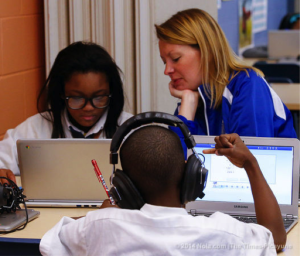School Performance Scores Released
2013-14 a stand still year
New Orleans hit the pause button this year. After 7 years of robust growth in school performance, 2013-14 remained flat.
Variability in School Scores
While overall city performance was unchanged, individual school scores varied a great deal from 2013 to 2014. Of the 63 schools that received a letter grade in 2013 and 2014, almost half had a letter grade change: 11 moved up and 19 went down.
- K-8 scores were impacted by a decrease in progress (bonus) points. Schools earn progress points by improving the performance of non-proficient students more than expected. This year the state changed the rules and made it more difficult to earn progress points1, so only five K-8 schools received the maximum of 10 points, whereas twenty-three received the maximum last year.
- 2014 K-8 scores also reflect the migration to Common Core standards. In the spring of 2014, students took LEAP and iLEAP tests that were Common Core aligned. (Students will transition to the new PARCC tests in 2015, unless this is changed by the current litigation.) While the state “curved” the letter grades so the distribution remained the same statewide2, the test results in the spring clearly showed some schools adapted to the new standards better than others.
- Finally, beginning in 2013, the state increased the inherent volatility of school scores and letter grades by using only one year of data to calculate letter grades instead of averaging two years of data.
School Performance Scores
Despite the variability in individual school grades, the overall grade distribution is about the same as last year.
- Two-thirds of students attended a school with a letter grade of A, B or C.
- 5% attended a school with a letter grade of F.

